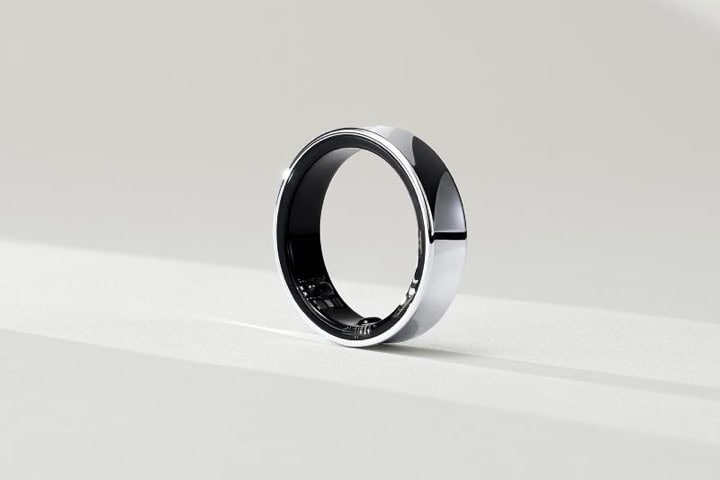
(Above: Samsung Galaxy Ring)
Oura might have rattled their saber a bit too vibrantly, and a bit too pre-maturely, at the wrong entity. In doing so they’ve upset a company not afraid to yield its massive army of lawyers, causing Samsung to preemptively sue Oura, maker of the Oura smart rings. And if you’ve got an 15hrs of flying as I did this week, then the 32-page legal filing makes for some fun legal spaghetti to untangle.
As you may remember, earlier this year Samsung announced their intentions to make a smart ring, the Galaxy Ring. At launch, very little detail was provided (basically none). Nonetheless, within hours of the announcement, Oura immediately started a public press offense against Samsung. Oura’s CEO and press team focused almost entirely on Oura’s intellectual property (read: patents).
In fact, Oura even reached out to me just a couple hours later, providing CEO quotes, and offers to talk to their executive team – almost all of which were about their patents and IP. In fact nothing in those initial communications from Oura discussed their technologies, or any technical competitive advantages. Instead, it was all about patents. While it might have been Oura’s intent to use Samsung’s entry into the smart ring market as a marketing exercise, it now appears Samsung was displeased by the front.
Now it’s notable that not all patents Oura has are actually from Oura. In fact, a number of the patents were scooped up by Oura via acquisition of patent portfolios. In the filing, Samsung details how a number of patents were initially crated by San Francisco based Motiv (of the Motive Ring). In 2020 those patents were acquired by Proxy, Inc. Following Oura acquiring Proxy in 2023.
Innovator or Patent Troll?
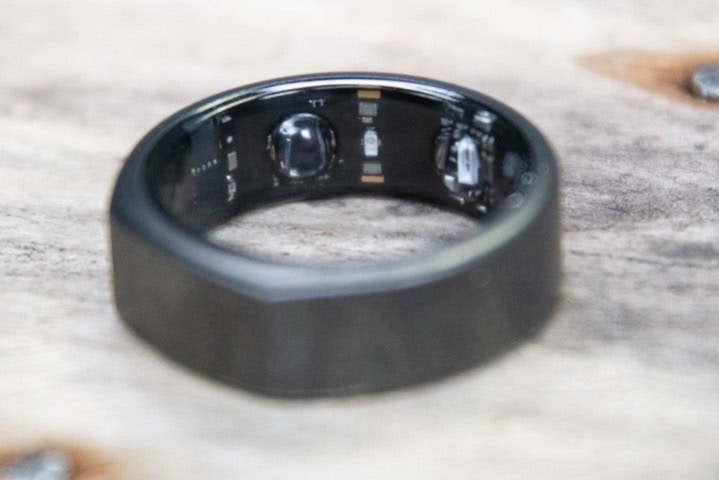
(Above: The Oura Ring)
The lawsuit is wide-ranging, but starts off with setting the stage that Samsung is concerned with Oura’s increasing lawsuit activity against upcoming competitors in the smart ring space. Samsung says:
“Oura has seen fit to assert infringement of its patents based on features common to virtually all smart rings, such as the inclusion of sensors, electronics, and batteries, and displaying a summary of the sensors’ measurements to the user, often in the form of a “score.” And Oura has sued at least one manufacturer of a competing smart ring product even before that product was delivered to customers in the United States.”
Samsung noted that after the January 17th, 2024 announcement of the Galaxy Ring, they received FCC certification back on March 28th (2024), followed by finalization of the design in May. They’ll start production in the next few weeks, and then expect to “begin sales and shipments” this August. The document also details more about the sensors in the ring, as well as various use cases. In a nutshell the Galaxy Ring seemingly provides more or less the same activity/sleep/HRV/blood oxygen/energy/recovery type scores as most other wearables on the market today.
But Samsung is specifically concerned about Oura trying to impede the launch of the Galaxy Ring via potential lawsuit (logical given Oura’s statements). Thus Samsung deciding to sue first is effectively a blocking maneuver to outline how they aren’t stepping on any of Oura’s patents, while concurrently outlining areas that they believe are questionable in Oura’s patents.
Samsung starts by invoking the ‘Good Samaritan’ angle on behalf of all smart ring companies, essentially saying Oura is a patent troll, noting in the filing:
“Oura’s pattern of indiscriminate assertion of patent infringement against any and all competitors in the smart ring market, and its statements confirming its intentions to assert its patents against all competitors in the market.”
It continues:
“Each and every time a major competitor has developed and/or released a product that competes in the smart ring market, Oura has filed a patent infringement action against that competitor.”
From there the document highlights, sequentially, each of the cases Oura has made it an annual tradition to file patent lawsuits against smart ring competitors:
Oura’s lawsuit against Circular (May 2022)
Oura’s lawsuit against Ultrahuman (September 2023)
Oura’s lawsuit against RingConn (March 2024)
I mean, I’m rarely one to agree with anything Samsung does technically in the sports technology and heart rate/sleep fields. But, their point is valid here.
Now, in not exactly the same words, Samsung is basically calling Oura a patent troll. And, depending on ones definition of a patent troll, that’s probably true. Generally speaking, when the public refers to the term “patent troll”, there’s two rough definitions that come to mind:
A) The first is when an established company and patent holder, selling established products will sue other entrants/companies for infringing on their property, usually somewhat excessively, rather than attempting to compete on merit/technology/etc.
B) The second type, and arguably the more correct definition, is when a patent holder (but not a company actually making a competing product) sues with the singular/sole intention to get licensing fees, but has no plans to use the patent themselves. These are typically companies that buy portfolios of patents, merely to sue other companies.
In this case, Oura largely falls under the first category. To Oura’s credit, they make a good product and actively have been selling that product for years. And to Oura’s further benefit, there have been some pretty darn questionable copycat’s, such as Ultrahuman – who completely and blatantly ripped off every element of their app and more, mirroring Oura. In Oura’s suit, we can see an example of this in the lawsuit (and that document lists a boatload of these examples):
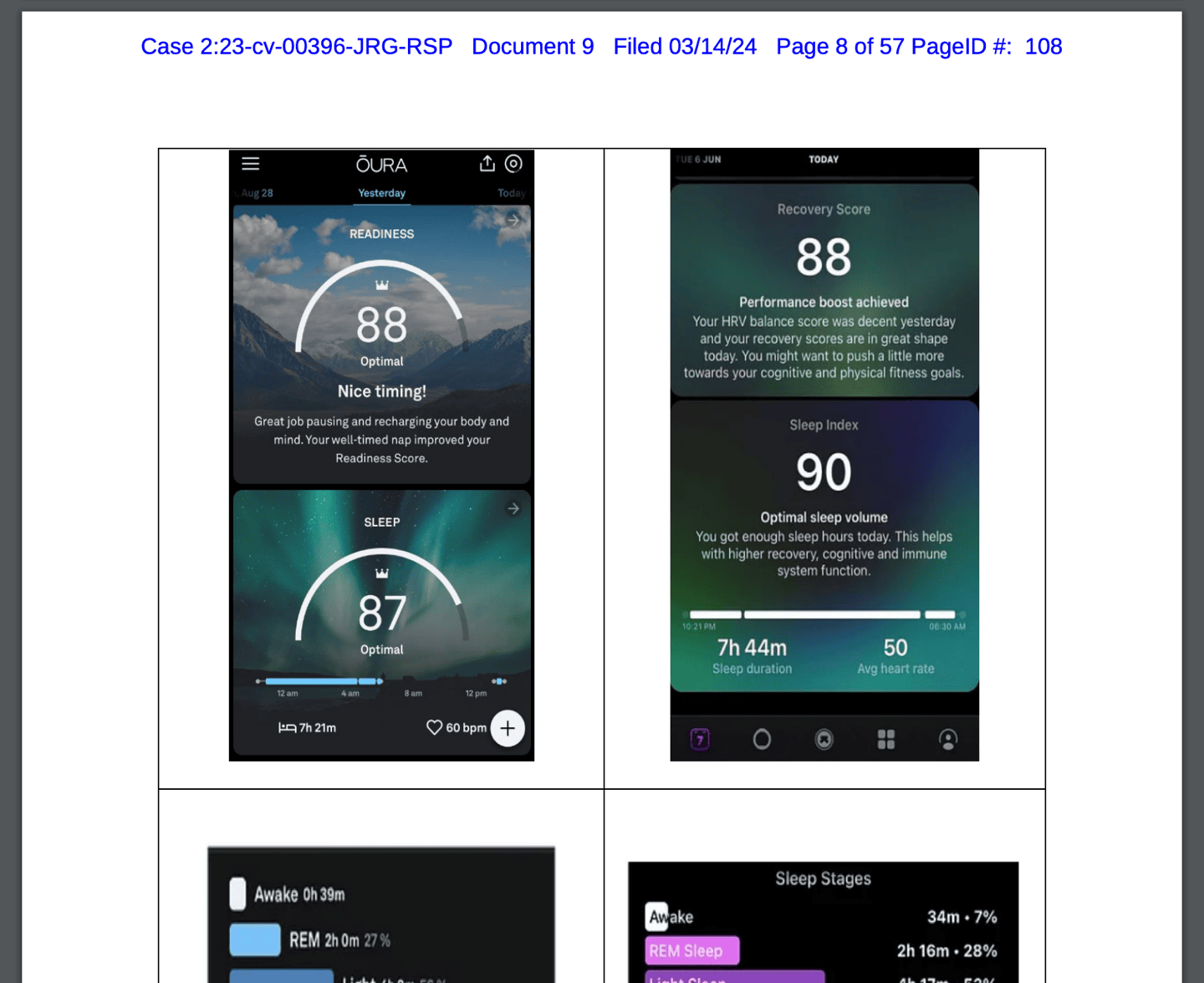
Frankly, as it relates to this software/etc example. I actually don’t have a problem with Oura suing them. They kinda (read: totally) deserved it. That said, from a pure legal standpoint, app design largely isn’t covered by their patents, so mostly the above imagery is busywork to set the stage for the real patient aspects Oura is upset about.
The Patents in Question:
Now, what Samsung cares bout here is preemptively getting confirmation that they don’t run afoul of key Oura ring patents. Five specific patents to be exact, out of the more than 100 patents that Oura has. The key patents being discussed are as follows:
1) U.S. Patent No. 10,842,429 (the “’429 Patent”) is entitled “Method and System for Assessing a Readiness Score of a User”
2) U.S. Patent No. 11,868,178 (the “’178 Patent”) is entitled “Wearable Computing Device”
3) U.S. Patent No. 11,868,179 (the “’179 Patent”) is entitled “Wearable Computing Device”
4) U.S. Patent No. 10,893,833 (the “’833 Patent”) is entitled “Wearable Electronic Device and Method for Manufacturing Thereof”
5) U.S. Patent No. 11,599,147 (the “’147 Patent”) is entitled “Wearable Computing Device”
These are the same key patents that Oura has previously used in lawsuits against other competitors. So, while Oura has many patents, these are the core ones that matter, and ultimately the main castle gate to their patent fortress, especially the hardware ones.
The patents in question are basically divided up into two categories:
A) Hardware ones: Related to how you pack electronics into a ring format
B) Software ones: Related to software algorithms, mostly focused on recovery/readiness as it relates to activity
Within the hardware section, Samsung is attempting to assert that their device does not infringe upon Oura’s patents. But that’s somewhat of a guise to then (likely) demonstrate that these patents shouldn’t have been issued. Still, the lawsuit is largely in factual mode, so owe see Samsung iterate through each of the patent claims, specifying they don’t meet the claims of the patent. Keeping in mind that a given patent has numerous “claims”, which can be considered like a list of ‘requirements’ as to whether or not an entity is infringing on that patent:
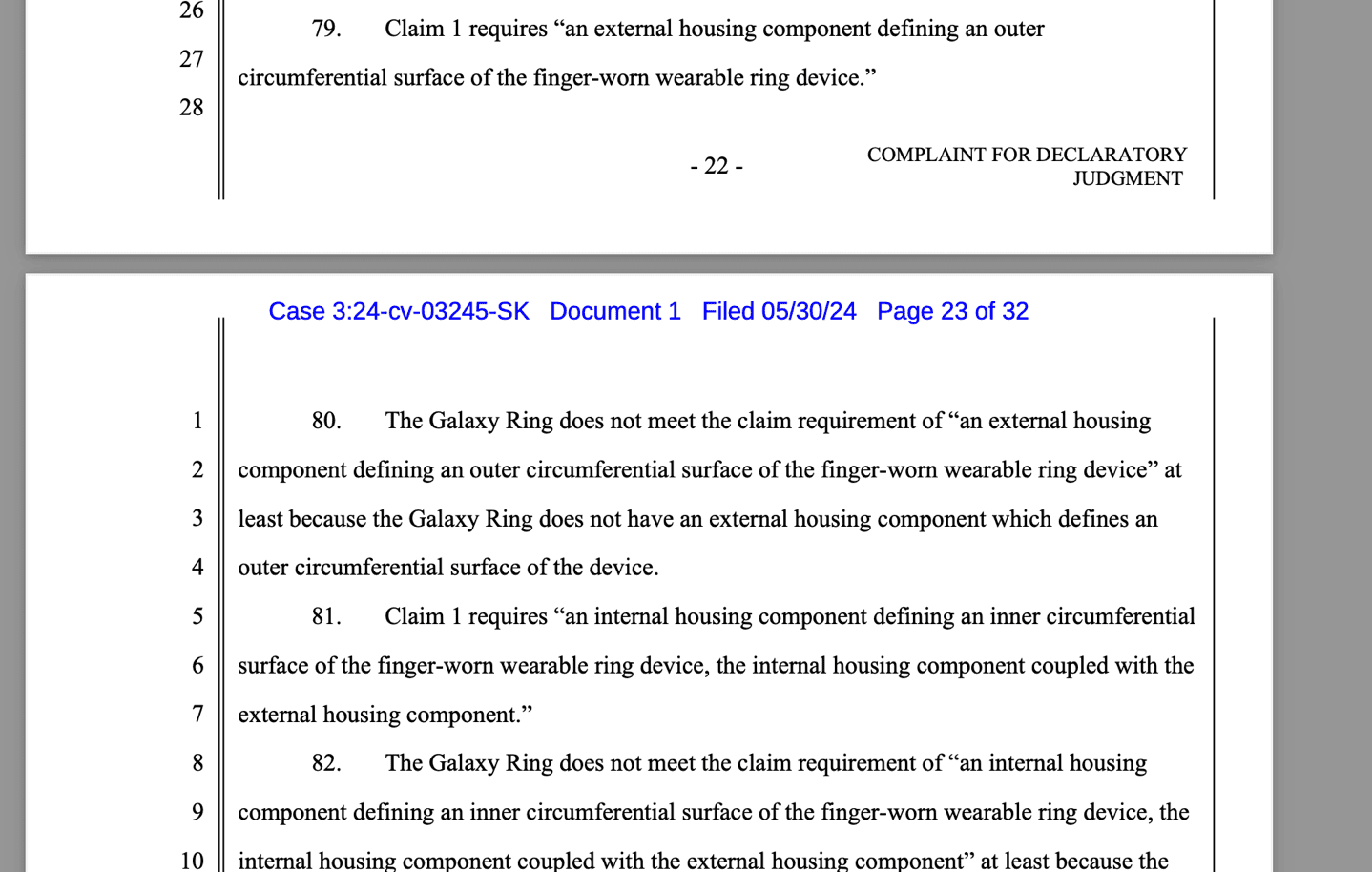
That said, in reading through it, it’s a wee bit hard to see how Samsung isn’t hitting some of these claims, since they are incredibly broad (e.g. inner/outer casing ones). Samsung notes at one point that it’s concerned about how broad some of these claims are, such as on patent that basically says any ring with electronic parts is covered by Oura. They note “in asserting the ’833 Patent against Circular and Ultrahuman, Oura alleges infringement based on a ring containing electronic parts.”
Which again, is setting the stage for Samsung to say the patent should be invalidated.
As we saw in the Wahoo case with Zwift, there’s plenty of cases (many in fact) when patents are being issued that really shouldn’t. In that case, the judge questioned many times the validity of some components of the patents, which likely nudged Wahoo towards settling with Zwift, versus risking those patents being invalidated.
In this case though, I don’t expect to see Samsung settle anything. They’ve got a gazillion lawyers with nothing better to do but research old dcrainmaker.com posts (you’d be surprised how often my older posts get included in legal dockets, due to demonstrating “prior art” concepts that existed long ago – including in the Zwift/Wahoo case).
Oura probably played with fire a bit too early (literally, within an hour of Samsung’s announcement), and as a result, they’re gonna get burned. Even if they somehow win every aspect of the legal case (they won’t), it’ll still likely cost them a massive amount of money and distraction. Sometimes it’s better to fight on product merits, than in a courtroom.
What’s interesting about the existing 2016-era patent by Oura on the software front, is their “Readiness” score (the ‘429 patent). That patent basically talks about taking various inputs (e.g. heart rate, activity, sleep), and then spitting out a score how it relates to your readiness to take on additional efforts/activity.
That patent essentially boils down to taking those inputs, but specifically from “a smart ring”, and then combining it with algorithms. However, said recovery-type algorithms have been around long-before the smart ring concept. We’ve seen those from numerous players over the year including Garmin, Firstbeat, Polar, Suunto, and others of the pre-2016 era. None of that is new, but adding data coming “from a smart ring is”, supposedly, “new” enough to have been granted a patent for “readiness score”.
Except, when Oura sued Ultrahuman for their “Recovery Score”, it was explicitly because the data came from a smart ring. In this case, Samsung is specifically concerned about their own “Energy Score”, which they say is based on sleep, activist, heart rate, and heart rate variability. That’s also the same as Whoop, Garmin, Fitbit, and others do for their own ‘readiness’ type scores. But again, Garmin/Whoop/Fitbit aren’t in trouble here with Oura, because the data comes from a watch, and not a ring. Which is why Samsung is concerned, saying “in asserting the ’833 Patent against Circular and Ultrahuman, Oura alleges infringement based on a ring containing electronic parts.”
But in Samsung’s case, they have to get even more into the weeds. Check out this section here how they split hairs on how the Samsung readiness score is calculated, versus the Oura one:
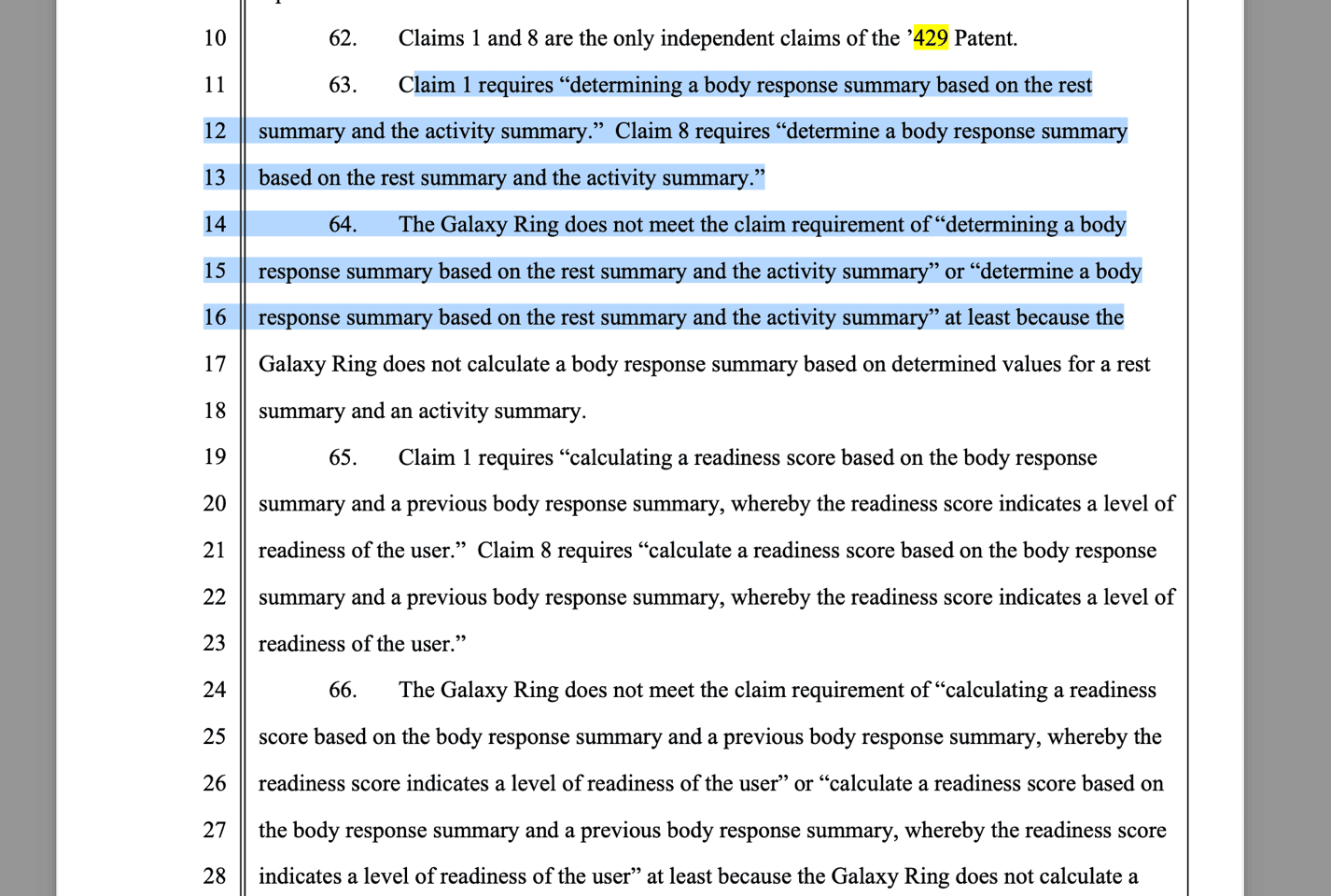
Of course, this is all just the beginning. As noted earlier, this early filing is all about Samsung getting in the first shot, in a favorable district, to ensure their initial sales and shipments can proceed without Oura holding things up.
But the longer term goal for Samsung is unquestionably to get some portion of these patents invalidated.
My bet? They’re gonna win. Not just because they have the biggest lawyers, but because some of the existing patents were either too broad, or already had shaky foundations of not passing the obvious test, especially around things like the readiness/recovery score (with the only ‘unique’ angle there being that the data came from a ring).
In talking to a few different industry people this week about it, everyone is of the same opinion: Oura is going to lose the war (even though they’ll win a few battles), they’ll likely get a slate of their patents invalidated, which will then open up the floodgates for other smart ring manufacturers.
Of course, only time will tell.
Thanks for reading


0 Commentaires